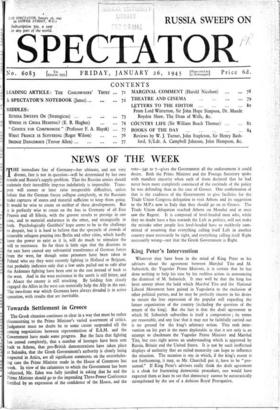King Peter's Intervention
Whatever May have been in the mind of King Peter or his advisers about the agreement between Marshal Tito and M. Subasitch, the Yugoslav Prime Minister, it is certain that he has done nothing to help his case by his reckless action in announcing the dismissal of M. Subasitch. It may well be that the king has been uneasy about the hold which Marshal Tito and the National Liberal Movement have gained in Yugoslavia to the exclusion of other political parties, and he may be perfectly sincere in his desire to ensure the free expression of the popular will regarding the future organisation of the country (including the question of the return of the king). But the fact is that the draft agreement to which M. Subasitch subscribes is itself a compromise ; its terms are reasonable, and any fear that it may not be faithfully carried out is no ground for the king's arbitrary action. This rash inter- vention on his part is the more deplorable in that it not only is an attempt to checkmate the Yugoslav Prime Minister and Marshal Tito, but cuts right across an understanding which is approved by Russia, Britain and the United States. It is not by such ineffectual displays of authority that an exiled monarchy can hope to influence the situation. The occasion is one in which, if the king's assent is not forthcoming, it may, as Mr. Churchill put it, have to be "pre- sumed." If King Peter's advisers really think the draft agreement is a cloak for frustrating democratic procedure, one would have expected them at least to see that democracy cannot be autocratically strengthened by the use of a dubious Royal Prerogative.


























